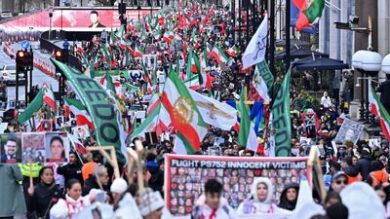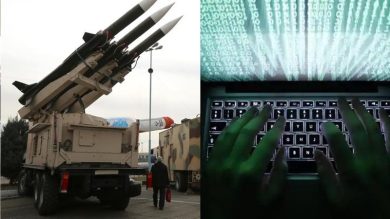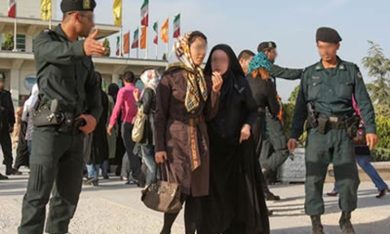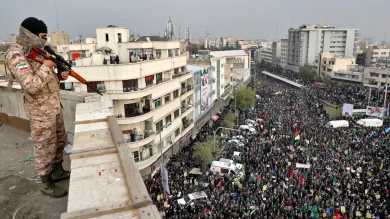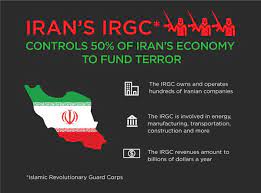For decades, the Islamic Revolutionary Guard Corps (IRGC) has played a central role in suppressing Iranian women’s rights. Through a combination of arrests, digital surveillance, and media censorship, the IRGC systematically silences women activists, journalists, and everyday citizens who dare to defy the regime’s patriarchal control.
The Women, Life, Freedom movement has exposed the brutality of the IRGC, as women across Iran resist forced hijab laws, demand political freedoms, and fight against economic and social discrimination. In response, the IRGC has escalated its campaign of repression, employing tactics of fear and control to crush dissent.
This report examines:
• Mass arrests of women activists and protesters.
• The IRGC’s surveillance tactics and digital repression.
• Censorship of women’s voices in media and online platforms.
• The global response and how the world can support Iranian women.
1. Mass Arrests: Targeting Women for Speaking Out
A. The Criminalization of Women’s Rights Activism
Women in Iran face arrest and imprisonment for acts as simple as:
• Removing the hijab in public.
• Posting social media content about women’s rights.
• Participating in protests against the government.
• Working as journalists who report on human rights abuses.
The IRGC labels these acts as “threats to national security”, using false charges such as:
• “Spreading propaganda against the state.”
• “Colluding with foreign enemies.”
• “Violating public morals and Islamic values.”
B. High-Profile Cases of Women Arrested by the IRGC
1. Narges Mohammadi – Jailed for Human Rights Advocacy
• Nobel Peace Prize winner and human rights activist.
• Arrested multiple times for opposing the death penalty and defending women’s rights.
• Currently imprisoned under harsh conditions for speaking out against the regime.
2. Nasrin Sotoudeh – The Lawyer Defending Women’s Freedom
• A human rights lawyer who defended women arrested for removing their hijabs.
• Sentenced to 38 years in prison and 148 lashes for her activism.
• Continues to fight for justice from behind bars.
3. Sepideh Gholian – Journalist and Labor Rights Activist
• Exposed IRGC abuses against workers and women.
• Arrested, tortured, and forced into false confessions on state TV.
• Recently re-arrested after publicly challenging the regime.
These cases highlight the IRGC’s ruthless crackdown on women who dare to speak out, turning prisons into centers of fear and psychological torture.
2. Surveillance: The IRGC’s Digital War on Women
A. Internet Censorship and Online Tracking
The IRGC operates a sophisticated digital surveillance system to track and punish women’s rights activists. Tactics include:
• Monitoring social media accounts for anti-regime content.
• Using artificial intelligence (AI) to detect protest-related keywords.
• Hacking activists’ phones and emails to access private communications.
• Geo-tracking protesters through government-controlled apps.
Women who speak out online often receive:
• Threats from IRGC cyber units warning them to remain silent.
• Summonses for interrogation, leading to arrests.
• Fake accounts spreading disinformation to discredit their activism.
B. The Role of the Morality Police in Surveillance
The Gasht-e Ershad (Morality Police), controlled by the IRGC, patrols public spaces to enforce dress codes and social behavior. Women face:
• Random stop-and-search operations to check for proper hijab compliance.
• Surveillance cameras in public spaces to identify those violating Islamic laws.
• Facial recognition technology in metro stations and airports to track activists.
These methods weaponize technology against women, turning every street, phone, and social media post into a tool of state oppression.
3. Media Censorship: Silencing Women’s Voices
A. State-Controlled Media and Disinformation
The IRGC controls Iran’s state-run media, which:
• Censors news about women’s protests and human rights violations.
• Spreads false narratives, claiming women’s resistance movements are foreign conspiracies.
• Forces political prisoners into televised confessions under duress.
Women journalists who attempt to report independently are harassed, arrested, and banned from working.
B. Banning Independent Journalism
Iran is ranked one of the worst countries for press freedom, with the IRGC:
• Banning foreign journalists from covering protests.
• Blocking independent Persian-language news outlets.
• Threatening family members of journalists who report from exile.
C. Social Media Blackouts and Censorship
The IRGC frequently shuts down the internet during uprisings, preventing:
• Protesters from organizing demonstrations.
• Activists from sharing videos of state violence.
• Families from finding information about detained loved ones.
Despite these efforts, Iranian women continue to fight back, using VPNs, encrypted apps, and international platforms to bypass censorship.
4. The Global Response: How the World Can Help
A. Designating the IRGC as a Terrorist Organization
The United States has designated the IRGC as a terrorist organization due to its human rights violations and terrorist activities.
• The European Union, Canada, and the UK must follow suit to:
✔ Cut off the IRGC’s financial networks.
✔ Impose travel bans on IRGC officials.
✔ Support targeted sanctions on Iran’s morality police.
B. Supporting Digital Freedom
Governments and tech companies should:
• Provide VPN access to Iranian activists.
• Support secure communication platforms to bypass surveillance.
• Hold social media companies accountable for blocking activists’ content under pressure from the Iranian regime.
C. Sanctioning Officials Responsible for Human Rights Violations
• Impose sanctions on judges and prosecutors sentencing women to prison.
• Block IRGC-affiliated businesses funding repression.
• Support international human rights cases against IRGC leaders for crimes against women.
D. Amplifying Iranian Women’s Voices
• International media must prioritize coverage of women’s resistance.
• Activists in exile should be given platforms to share testimonies.
• Universities and institutions should support Iranian women’s scholarships and asylum programs.
Conclusion: Women Will Not Be Silenced
The IRGC’s crackdown on Iranian women has exposed the regime’s desperation. Through arrests, digital surveillance, and media censorship, the Iranian government seeks to erase women’s resistance—but it has failed.
Women like Narges Mohammadi, Nasrin Sotoudeh, and Sepideh Gholian continue to lead the fight from prison cells. Journalists and activists risk their lives to speak the truth. The global community must act now to support them.
Join Our Newsletter!
Stay informed with the latest updates, news, and ways to take action in the fight for justice and global security. Sign up now to get updates delivered straight to your inbox!

